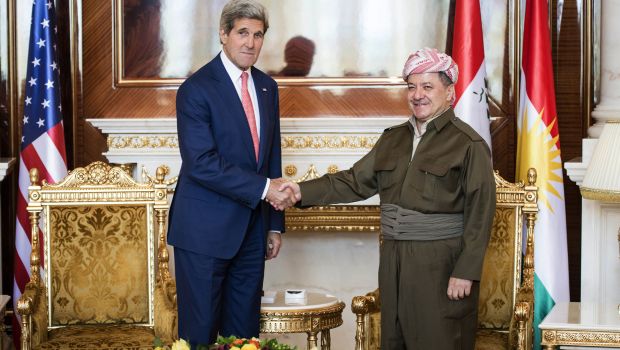
Kurdish President Massoud Barzani (R) shakes hands with US Secretary of State John Kerry at the presidential palace in Erbil, Iraqi Kurdistan, on June 24, 2014. (AP Photo/ Brendan Smialowski, Pool)
London, Asharq Al-Awsat—Kurdistan Regional Government (KRG) President Massoud Barzani threatened secession from Iraq unless Kurds are “real partners” in the state.
His comments, which came during a meeting with US Secretary of State John Kerry in Erbil on Tuesday to discuss the Islamic State of Iraq and Syria’s movements in Iraq, included a rejection of Prime Minister Nuri Al-Maliki’s attempt to secure a third term in power.
Speaking to Asharq Al-Awsat by phone from Erbil, Minister Falah Mustafa, head of the KRG’s Foreign Relations department, said: “During the meeting, President Barzani stressed the importance and necessity of change, and that if the situation remained the same, there would be no need to participate in the next government.”
But on Wednesday, Maliki rejected the idea of forming a “national salvation” government with greater representation for Sunnis and other minority groups, saying such a government would be contrary to the results of the April 30 legislative elections. Maliki’s State of Law coalition won the most seats in that poll, but fell short of the simple majority needed to form a government.
“Maliki should not remain as prime minister for a third term, because he is the cause of the crises in Iraq, and will only create even more crises, particularly after he excluded and marginalized Iraq’s Sunni community. Maliki stood against the development of the Kurdistan region, and there are even Shi’ite parties that do not want him in power,” Mustafa added, calling for a “radical change which guarantees a new political situation that is built on trust.”
The KRG president’s comments to Kerry on Tuesday are part of escalating discourse from Kurdistan leaders regarding the possibility of secession, particularly after Kurdish Peshmerga forces took control of the contested city of Kirkuk earlier this month.
Speaking to CNN on Monday, Barzani said: “The time is here for the Kurdistan people to determine their future and the decision of the people is what we are going to uphold.”
The US Secretary of State has called on the Kurdish leadership to support the Baghdad central government in its fight against ISIS. Falah Mustafa, who is the most senior KRG official in charge of foreign affairs, told Asharq Al-Awsat: “They [Barzani and Kerry] talked about the reasons behind the events in Iraq and the roots of the crisis, namely Baghdad’s mismanagement of the situation and its exclusion of Sunnis, Kurds and other sections of Iraqi society from the political decision-making process. These problems must be addressed.
“If a new situation is necessary in Iraq, we must move towards the change that all parties are calling for, namely changing the prime minister, because he is directly responsible for what happened in Iraq, particularly the latest crisis.”
Kerry and Barzani did manage to come to an agreement regarding how to handle the ongoing crisis in Iraq, according to Mustafa: “An agreement was reached on the need for a political solution first to confront the crisis, followed by a military solution to confront the armed insurgents who threaten the security of Iraq as a whole.
“The roots of the problem are political, not military. The ‘war on terror’ the government is talking about involved sectarian score-settling, and the Kurds will not participate in sectarian wars such as this.”
The first US troops deployed to assist the Iraqi army in combatting ISIS have arrived in Iraq, the Pentagon announced on Tuesday. Two teams totaling 40 US troops have already begun operations assessing Iraqi troops on the frontline, the Pentagon said. Washington is set to send up to 300 special operations soldiers to help train Iraqi government troops to fight the Islamist insurgents.
Kerry sought to play down the deployment of the troops on Tuesday, saying it did not constitute an “intervention.”
“We are not here in a combat role. We are not here to fight. And the president has no intention—none whatsoever—of returning American combat troops in Iraq to go back to where we were,” he said.
Kurdish Peshmerga forces have been mostly successful in pushing back against the ISIS advance, and many in Iraq and beyond have been looking to the KRG to offer political and military support to the central government.
But according to Mustafa, Barzani did not seem inclined to offer such support during Tuesday’s meeting with the US secretary of state.
“President Barzani told Kerry that the Kurdish people have sacrificed a lot, built a secure region which has a balanced foreign policy and a successful economy. We asked Baghdad to cooperate to take Iraq forward together and to live as real partners within a constitutional, federal Iraq,” he said, adding that “regretfully, the government in Baghdad did not listen to our opinions and views and sought to deal with our people in the Kurdistan region as second class citizens.
“We and our people strongly reject any marginalization or for our people to be treated as second-class citizens. We cannot live under a dictatorship; we must also have complete clarity on this subject and be partners in a constitutional, federal and democratic Iraq, and not part of this chaos and sectarian conflict.”
